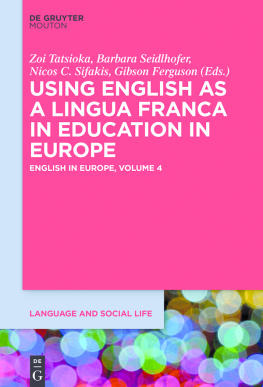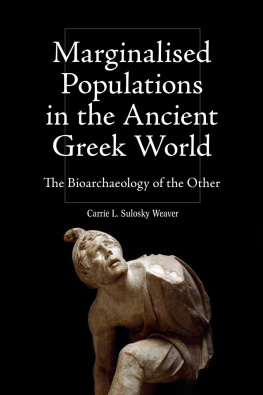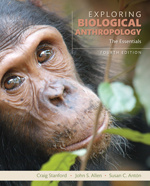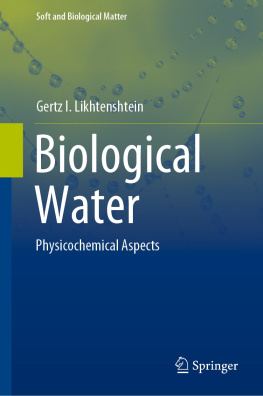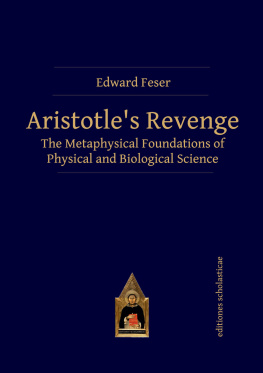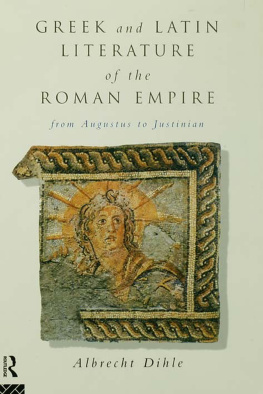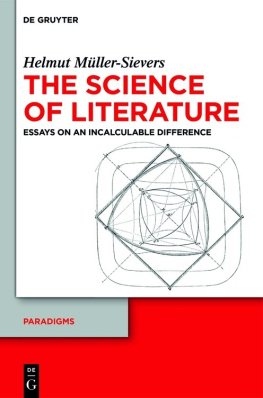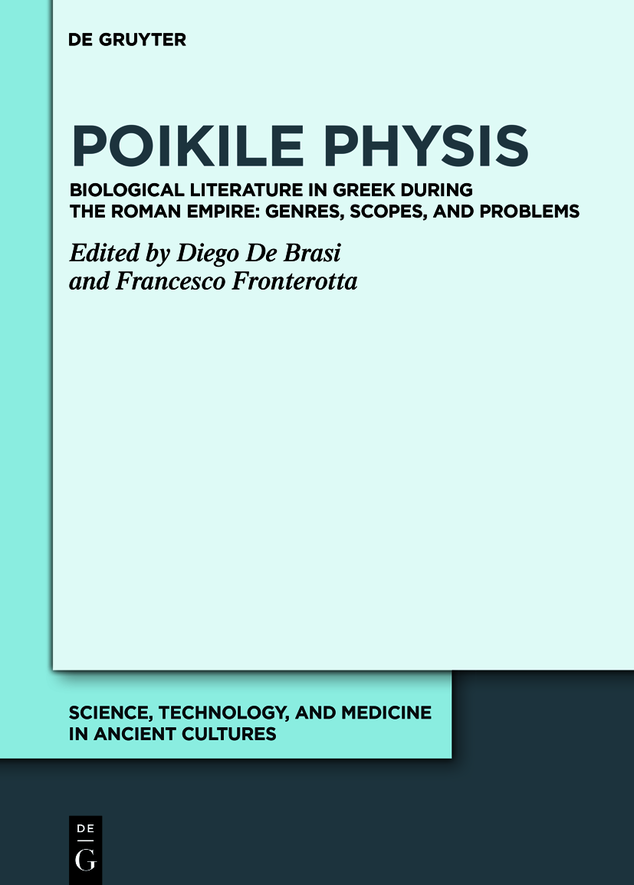The Deutsche Nationalbibliothek lists this publication in the Deutsche Nationalbibliografie; detailed bibliographic data are available on the Internet at http://dnb.dnb.de.
Imperial Greek Biological Literature: A Twofold Poikilia
In the epilogue to his extensive collection of animal stories, Aelian, a Roman rhetor writing in Greek in the 2nd3rd century CE, defends his procedure of not having imposed a systematic arrangement on the various tales:
, , , , , , . , , , , , . , , , .
I am aware too that some will express disapproval because I have not in my discourse kept each creature separate by itself, and have not said in its own place all that is to be said about each, but have mixed the various kinds like a varied pattern in the course of describing a great number, at one point dropping the narrative about such-and-such animals, at another going back and stringing together other facts about their nature. Now in the first place, speaking for myself, I am no slave to anothers judgment and will: I maintain that it is not my duty to follow anothers lead wherever it may take me. And in the second place, since I was aiming to attract through the variety of my reading matter, and since I flee from the tedium arising from monotony, I felt that I ought to weave the tissue of this narrative of mine so as to resemble a meadow or a chaplet beautiful with its many colours, the many creatures, as it were, contributing their flowers. And although hunters regard the finding of even one animal as a piece of luck, I maintain that there is nothing splendid in finding the tracks or capturing the bodies of such a multitude of animals, whereas to track down the faculties which nature has seen fit to bestow upon them that is splendid (transl. A. F. Scholfield).
Admittedly, Aelian is referring with this statement to his own compositional choices, and thus positioning himself in a specific literary tradition.
Oddly enough, however, it is quite difficult to delineate the precise characteristics of biological Greek literature in the imperial age. Indeed, while a philosophical and theoretical interest in biological phenomena can be observed in the Greek literature of the so-called classical period a scientific interest that reaches its methodological and systematic apex in Aristotle and his disciples the appeal of pure biological inquiry seems to give way to other concerns during the imperial period. This does not mean, however, that biological problems were not discussed at all in works composed during the imperial era. Such questions are, of course, dealt with in technical writings, such as Galens medical treatises, or in philosophical works, such as Plotinuss Enneads or Porphyrys De abstinentia or Ad Gaurum. With the exception of Galen and other physicians,
Hence, although we do not find in imperial Greek literature anything comparable to Aristotles De generatione animalium and Historia animalium or Theophrastuss Historia plantarum (once again with the possible exception of medical treatises), the term Greek biological literature may be used to describe a variety of texts from the imperial period, ranging from philosophical dialogues to examples of paradoxographical literature, didactic poems, and Christian homiletic writings, which have in common that they reuse biological knowledge within the framework of their specific rhetorical and argumentative strategies. Thus, while it may well be true that, under the Roman Empire, biological knowledge was essentially derivative and that biology was not a specific subgenre of scientific literature, it is still possible to consider works as disparate as the dialogue Alexander by the Jewish philosopher Philo of Alexandria, writings like Plutarchs De sollertia animalium and Bruta ratione uti (along with Aelians De Natura Animalium), didactic poems like Oppians Halieutika and Pseudo-Oppians Cynegetika, and Basil of Caesareas Homilies on the Creation as examples of imperial Greek biological literature (a full list would be much longer).
From this point of view, then, imperial Greek biological literature is poikile in a twofold sense, so to speak: First, it is variegated in the sense that it manifests itself in a variety of genres, which, except for medical and philosophical treatises, do not pursue an explicitly analytic or investigative intention. Second, those works that can be labeled as examples of biological literature deal with, describe, and adapt to their rhetorical and argumentative aims the variety of observable zoological, botanical, and embryological phenomena, among others i.e., they try to depict how poikile nature (physis) is.
Modern Scholarship on Imperial Greek Biological Literature: A Very Brief and Selective Overview
This twofold poikilia has led to a general disinterest in imperial Greek biological literature,
The heterogeneity of literary genres and topics in imperial Greek biological literature has a clear counterpart in an equally significant disparity between different research approaches. Thus, since a major reason for the development of scholarly interest in imperial Greek biological literature has been the growing cultural importance of Human-Animal Studies and philosophy of mind, as disciplines on the boundary between the natural sciences and the humanities, some studies have focused on topics connected to these disciplines. For instance, scholars have focused on the interaction between animals and humans, examining not only biological or moral-psychological questions, but, at the same time, concentrating on ritual and religious aspects. an interest which, however, has yet to lead to a systematic and comprehensive examination of the topic.
The Scope and Content of this Volume
Following the suggestion made by Jason Knig and Tim Whitmarsh, who recognize in imperial scientific writings the potential for innovativeness in compilatory styles of composition, aims to analyze a number of selectively chosen, exemplary texts from the tradition of imperial Greek biological literature and to shed light on questions regarding both their literary form and their function as means of knowledge transfer.
The first focal point is zoological literature. Both the authors and their audiences were influenced by contemporary cultural and philosophical discussions, for example, the debate between the Stoics and the Middle Platonists about the presence or absence of affective and cognitive faculties in animals. Zoological and physiological knowledge was often deployed in works that explicitly posed the question of the extent to which animals do or do not possess reason, such as Philos Alexander, Plutarchs writings on animals, and Aelians On the Nature of Animals. While a simple reconstruction of the arguments and their attribution to the respective schools is a relatively simple matter, the contributions in this volume focus on the mechanisms by which the authors depict the interplay between these traditions and adapt them to their argumentative aims. We often observe in different writings that biological knowledge is adapted and used either for practical-pragmatic purposes (such as in Oppians


